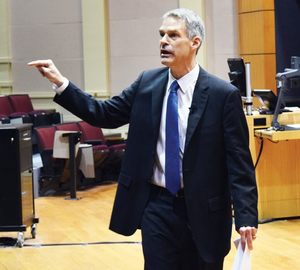Professor gives personal finance advice to graduating class
Published: April 12, 2017 / Author: The Observer

Sarah Olson photo
Notre Dame finance professor Carl Ackermann presented a lecture on personal finance and money management to the class of 2017 last night.
Sponsored by Senior Class Council and the Mendoza Student Leadership Association on Tuesday, “The Path Ahead: A Roadmap for Your Financial Future” is the first of two seminars Ackermann will present on financial management.
The second seminar will be held next Tuesday, April 18 at 7 p.m. in DeBartolo Hall 101 and will address topics like budgeting, credit and debit cards and college loans.
This lecture focused mainly on the financial steps students should make following graduation — beginning to think about bonds, stocks and investing in your employer’s provided retirement plan are key to making smart investments.
In debriefing these concepts, Ackermann made the main goal of his lecture clear. Ackermann said accumulating money to help others should be the central goal of growing your wealth.
“Though we are going to be talking about finance today, I truly think amassing wealth is meaningless,” he said. “This is not financial advice, but it is tips and tricks you can use to help others.”
Ackermann first acknowledged some students in the room likely had no background in financial concepts, so he distinguished bonds and stocks, noting that students should know their purposes and differences in making investments. Bonds, he recognized, were safer because of company payment obligations, and stocks though the value may fluctuate, often rise.
“Usually, unless I’m picking them, stocks tend to go up in value,” he said. “Stocks, on average have earned higher returns. Stocks, on average, have an 11 percent investment return while bonds only return on 6 percent.
One tip Ackermann gave graduating seniors is that they are going to be dealing with lots of financial processes they have never seen before.
“You are going to see a lot of taxes taken out of the money you earned,” he said.“One of these new concepts is retirement plans: 401(k) is the standard for profit company plan; 403(b) is used by non-profit organizations.”
Ackermann referred to these not as retirement plans but as “freedom plans,” because over time, these accounts will enable people to have the freedom to do what they want with their post-career lives.
Because mutual funds are often one of the only types of investments in retirement plans, Ackermann advised students on tips and tricks to choose an ideal mutual fund from the ones made available by employer’s retirement plans. The two important factors that determine a mutual fund’s performance is the expense ratio and turnover rate; the higher these two number are, the worse a mutual fund will perform. Ackermann recommends students seek mutual funds with a low expense ratio, low turnover and with no entry of exit fees.
Ackermann stressed the importance of investing early on, at age 22, upon graduation. He said if you begin investing even just a decade later, by retirement age, you will have made less than half the money you could have made if you’d started investing ten years earlier.
“If you get on a serious investment plan from your employer, you can retire a lot earlier and get to do things you love and help people in real need,” he said. “What can you do with your gains to improve your life and mostly brighten the lives of others?”
He listed the possibilities of life after work — taking a job that pays less because you know you are well covered, spending more time with family and friends and doing substantial volunteer work.
“You certainly can make the world a better place. I hope that you will go on to do that,” Ackermann said.
Story by Lucy Lynch.



